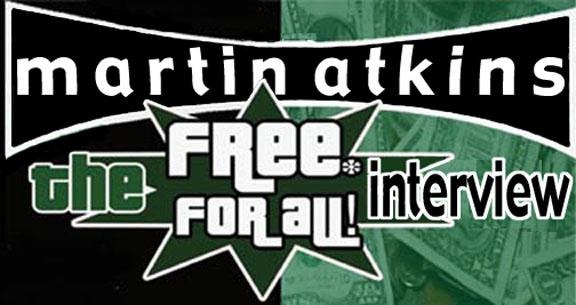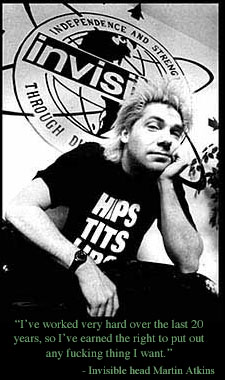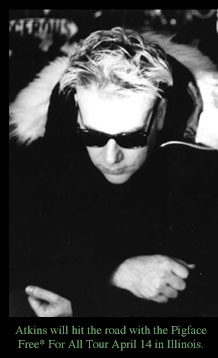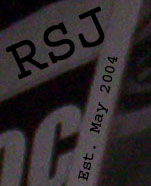|

The Free* For All Tour works like this: first, you pay $12 at the door to see this year's line-up of Pigface, which includes
En Esch, Charles Levi, Krztoff and Hanin Elias, among many others. Then, you get $12 back in coupons to use at the merch
table. Simple? Pretty much.
The Free For All Interview, however, works like this: first, we ask Pigface founder, label head, and now Columbia College
teacher Martin Atkins a series of questions regarding Pigface, Invisible Records and his critics. Then, he gives us his unflinching,
uncensored opinions on these subjects and more. Simple? Hardly. Controversial and intriguing? Absolutely.
Rock Star Journalism: You've said Pigface resulted from wanting to see what would happen if the group on the 1989 Ministry
tour recorded together. Did you always envision the band evolving as it has, or have you been surprised by the many directions
Pigface has taken over the years?
Martin Atkins: I would love to say that every moment has been carefully crafted, but I think that being a horrifying ex-alcoholic,
I've managed to surround myself with elements of chaos and fear and newness. So, there's been the basic energy of Pigface,
which was difficult in the beginning cause we didn't even know what it was. And then you have Pigface 2.0, which is that
people get the idea, so new people coming in get the idea. And then you have Pigface 3.0 -- the "taking your kids to
Disneyland" experience -- which is like, sometimes I might not be amazingly thrilled to play "Suck" again,
but watching nine people go berserk in front in me, watching the chaos through the delight in somebody else's eyes, is an
absolute buzz. So, the evolution of it is just natural. Why would I want any of the people now, to hand them a card and
say, "alright, you're going to be Colonel Mustard in the library?" Cause someone else has already been Colonel
Mustard. You can be Colonel Red, White and Blue, naked, in the shrubbery.
I don't want to say I've stumbled into this because I think that would be ridiculous of me, after 25 years of doing this,
to claim it was an amazing stroke of whatever. Obviously, there's some planning, there's some managing to get home even when
you're drunk kind of radar. But it's glorious -- I'm thinking this next line-up is going to be as electric as any line-up.
RSJ: Well, I saw that this is listed as the "wildest line-up ever."
MA: You know, we always put that.
RSJ: So, every line-up is the wildest line-up ever?
MA: It always feels like it is. I think when you're in Pigface, the question for the first five years was "who's
gonna be there?" Now the question is, who isn't? I know there were a few shows where the promoters had insisted that
everyone who was gonna be there would be on the contract, listed by name and guaranteed that they'd be there. And the two
shows that happened to the most ridiculous degree, Trent [Reznor] ended up showing up. So, it's like, look, there you go
fucko. Who knows? There are no rules with Pigface.
RSJ: Would you say that Pigface is, in a way, your outlet to do whatever you want without any sort of structure?
MA: Right. But everybody [gets to do what they want]. I'm so amazed, I hear of bands now with members who aren't allowed
to play with other bands. It's like, you know what? Fuck off. How can you not allow somebody to explore their creativity?
And the stupidity of that kind of narrow-mindedness is that the people telling band members that they can't be in other bands
are fucking themselves. Because when people come out with Pigface, for instance, and they go back to their other bands, they
take with them a different viewpoint. Pigface is so many different things to so many different people. In some ways, it's
been rehab for a few people.
RSJ: Literally and figuratively?
MA: Oh, yeah. I mean, Ogre and I have our ups and downs, but he said that he thinks he would be dead if it wasn't for
Pigface. Basically, we kind of surrounded him for a tour that became part of his rehab. It's been rock and roll rehab for
some people whose flame was dying out a bit. It's a spiritual thing. It's also really rough. People have broken ribs, broken
hands, been very ill -- it's full-on.

RSJ: I know you took the name, Pigface, from the band you had when you were 12. Since you've been involved with music for
most of your life, would you say that there is any theme that flows throughout every project you've been involved with?
MA: I would like to think an attitude has. I would hope a fearlessness and a willingness to explore. From the harshness
of early Damage Manual to Opium Jukebox to the Bedazzled EP I did with Chris Connelly. I would hope a kind of punk rock anarchic
attitude.
You know what happened to me the other day? I'm putting together a tribute cd to PiL, and I was talking to a band who
are doing quite well now and they were concerned about how each of the other bands [on the cd] were soundscanning. And I
just thought, you lame-ass corporate fuckwads. These kids are so entrenched in this idea that they thought was so smart,
to have an understanding of the business, but they're not strong enough to get out of it. To have this narrow view of what's
important in music was just disgusting to me. So, to circle back around to your question, the attitude is constant for me
of exploring and not giving a flying fuck. On the one hand I'm lucky -- I don't have to worry about will my label release
this album, cause it's my fucking label. But on the other hand, I'm not lucky cause I work nine days a week doing anything
I need to do to sustain my label. I've worked very hard over the last 20 years, so I've earned the right to put out any fucking
thing I want.
RSJ: You used to have a construction company prior to Invisible --
MA: Not for long. That was when I left PiL, I said fuck this, fuck the music business, fuck playing drums and I joined
up with two guys and we started a construction business. But it was short, it was maybe eight months to a year before Killing
Joke asked me to go join them.
RSJ: Do you think the little bit of experience you had with the construction company helped with getting Invisible started?
MA: Well, I had a label before Invisible, which immediately folded and cost me 12 grand of other people's money, which
took a long time to pay back. I think that was the experience that taught me a lot.
RSJ: Invisible began in New Jersey, right?
MA: Yeah.
RSJ: What was the biggest advantage of moving it to Chicago?
MA: It wasn't New Jersey. In Chicago at that time, '87-88, Chicago was mad. Ministry was here, Revolting Cocks, Wax
Trax, everything was going on here. It felt like the center of the universe. So, I was just magnetized here. And I think
there's all kinds of geographical advantages to being in Chicago. I have a band up in Portland called Railer, and it's tremendously
difficult for them because after they play Seattle and Vancouver, San Francisco's a trek, LA's quite a trek -- lots of miles,
lots of gas money, lots of wear and tear on vehicles and not many people to play to. Chicago's great in that it's quite centrally
located.
RSJ: As I'm sure you know, there are a lot of internet rumors regarding Invisible Records.
MA: No, I don't.
RSJ: You've never stumbled upon any of those?
MA: No, I haven't.
 RSJ: Well, there's a few regarding problems at the label right now and some that go as far as to say it's on the verge of
folding. So, to clear things up, what is the state of Invisible at the moment?
MA: First of all, the internet is a wonderful place full of people who say whatever they want based on unfounded bullshit.
Invisible is 18 years old, Underground Inc is five years old, the recording studio has never been more active. The Damage
Manual album, just the sounds on there, are really refreshing to me -- they sound like early '80s and they sound like 2010
at the same time, and that record was made here at our own studio. Everything that's been done in that studio has been released.
We have a great relationship with Ryko Distribution. I think it's tough to change distribution -- we were with Caroline Distribution
for nine years -- it cost us a lot of money and energy to move lots of cds from one distributor to another. But the release
schedule we have now -- we just signed Hanin Elias, and I'm signing two fucking great bands who are very different and exciting.
Our relationships in Europe have never been stronger. It's a great time. To me, things have never been better.
I'm getting better at dealing with some of the hypocrisy and bullshit and outright lies. And actually, I don't even see
a lot of that stuff because I'm busy in the office at five in the morning. I've got a 45 day tour that we booked ourselves
with an amazing fucking line-up of Pigface that's actually real, that's happening, not just being talked about on the internet
by some disgruntled fuckhead.
At some point a couple years ago I got pulled onto a Ministry message board, and just stopped talking to people because
if you haven't run a record label you don't know how fucking difficult it is. And if you haven't released more than 10 albums
you have no clue how difficult it is. I've had people from other labels that I've tried to help get upset with me because
we did a tribute to the Dead Kennedys. Well, I liked that tribute. And some guy with a label who's sold 500 copies of something
[made a negative comment about me]. You know, we sold 10,000 copies of the tribute to the Dead Kennedys. Fuck off. Actually,
the guy I was having this argument with, just as it was getting heated, it stopped cause his internet service got cut off
cause he couldn't pay the bill. How fucking dare you criticize me for putting out a tribute album when your electricity isn't
even on?
So, it's tough, I don't want to sound like an asshole, but it's really tough to work with artists and help them do what
they think they want. Try and guide them through the mess that American distribution is. But, I mind any criticisms of me
and the label less. What I mind is when I stop helping somebody and they get really upset cause then nothing's happening.
When I'm working with somebody I can help them a lot, and when I'm not working with somebody, maybe there's not anybody that
can help them. There's a great quote, "there's no such thing as an artist that's been ripped off by the music business.
Being ripped off by the music business is a hallucinatory comfort blanket artists cling to when their visions of unending
wealth and undying critical acclaim end in the dirt." So there. Two years ago Meg Lee Chin made a really big song and
dance about being free from the label and free from my controlling clutches. And nothing's happened since.
RSJ: You stated that the idea of "friends don't let friends start labels" was your philosophy on helping the
people under the Underground, Inc umbrella. Would you like to see more camaraderie amongst independent labels in general?
MA: I don't know that we slag on each other, but I don't know that it would be good for us to work together. Metropolis
is its own very successful thing; people are doing their own things. It frustrates me when I see a bunch of bands doing their
own thing and making the mistakes we made 10 years ago. It's like, we don't all need to make those mistakes guys. You can
tell some people, don't put your hand in that flame -- oh, look, you burned your finger. And then what can you say? I told
you so? Then you just look like an asshole.

RSJ: In reference to the community of Underground, Inc you've said, "It's those communist posters come to life: unity
is strength and all that stuff." How do you feel that applies to the industrial community as a whole, which often has
a tendency to splinter into different groups?
MA: I guess it doesn't apply to it at all, does it? To me, that's the spirit within the label and within the office here.
I started off playing rock when I was very young then pop rock came around and that stopped me in my tracks. And then I
think that experience enabled me to see beyond punk. Public Image Limited, we were quite experimental. There's Johnny Rotten,
the king of punk, and we were exploring reggae and dub. And then I thought industrial music was kind of a continuation, and
I think the reality is, disappointingly, that the genre has become more and more narrow. I'm happy with my label exploring
dub, digital hardcore, music with defragmentation, ambient dance -- I don't know that many people are comfortable exploring
anything anymore. It can't be about the sounds, it has to be about perceptions. And I think part of it is that people don't
have a fucking clue.
I used to walk on stage at the end of a Pigface show, and start singing an Abba song. There's times when I'd sing "American
Pie." And it's like, well, what are we gonna do then? Bring out some more oil drums and be more industrial? No, I'm
gonna sing an Abba song and you can all fuck off. At an in-store in Chicago for the Welcome To Mexico release party, I hired
a mariachi band. That's punk rock. But people just freaked out, like, how dare you? How close-minded to just listen to
whatever increasingly tiny internet community is remixing each other and not releasing any albums on any labels. I think
people are just frightened of standing up in a room and saying "I fucking love the Bay City Rollers!" It's just
people being herded around and not being individuals, which is anti punk rock and anti industrial. And I mean anarchic, start
your own label, fuck everything punk rock. Not Green Day.
RSJ: You've said in the past that you expect bands you work with to "put everything on the line for the music."
Who have you worked with that you feel has met this expectation?
MA: Railer is a band that springs to mind. They jumped in a van in Portland and drove to Salt Lake City to play a show
in front of the people from Amp energy drink. And then the show was cancelled, but they really dealt with that very well.
I'm working with a band right now called The Countdown. The guy at Kinkos handed me their demo and I called them up the
next day and rambled on for about 20 minutes about 1978 punk rock and two minute hit singles and what I would do with some
of their songs. And then they came in and I brought Steven Seibold in to work on the record and now there's an album nearly
finished. But here's the thing: they just had a baby. And it remains to be seen what they're prepared to put on the line
for their music. I don't ask anybody to do anything I haven't done myself. Unless you're willing to put 110% into something
in the music world in 2005, you're fucked. And actually that Countdown record is getting a ton of airplay, but we're a small
label, and I can only bring other elements to bear when a band are touring. While she was pregnant, I tried to do everything
I could to move the record along. Now they have a baby, and it's time for them to emerge from that and deal with it and see
what role The Countdown and their music is going to play in their lives. And I will certainly match them toe to toe with
everything they're prepared to do.
RSJ: You've said that it only makes sense to do one tour if you're going to do three more. Explain the reasoning behind
that philosophy.
MA: For a developing band, all the first tour does is get you up to speed. It lets you know if your band works, if your
drummer's a freak who likes 14 year-old girls -- which has happened to bands we've worked with -- I mean, these are things
you need to know. Can the guitarist leave town without his wife harassing him? You find out the places not to play. You
find out you're huge in Florida, but people don't give a shit in Georgia. The first time through, you're generating smoke,
and if you don't do something with that smoke, it dissipates. People's memories are short. You've got to be better the second
time to seem as good as you were the first time to the people who already saw you. Then you need to go back the third time
to have those people bring their other friends and the guy from the paper who couldn't come the first time. Then you've gotta
tour the fourth time cause if you don't, then that good review is wasted cause you haven't turned it into some t-shirt sales.
I've talked to a bunch of bands who've spent 20 grand getting halfway there and making some very simple mistakes that
I want to try and help them avoid. You should fail because your band is shit or because you don't have the balls. You shouldn't
fail because of a lack of some basic advice and a bit of planning.
RSJ: You once said that you've seen people come out and help bands in need on tour in surprising ways -- what's the best
example of this you've seen?
MA: Oh my god. I've had people lend me $750 for a new transmission. I'm still friends with the people whose bedrooms
were given to me. It doesn't have to be big stuff, it can be the tiniest stuff that has the biggest impact. There are loads
of moments like that where people who didn't have to do anything did something great.
RSJ: We saw on ebay, you're auctioning the chance to get married at a Pigface show on the upcoming tour. Any takers on
that yet?
MA: I don't think anybody's doing it on this tour yet, but we've had five people do it so far. One of the guys that was
married on the last tour is coming out to do a documentary film on this tour. The five weddings that we've done have all
been very different. The couple that got married on stage in Atlanta, it was part of the last six months of the girl's life.
Talk about feeling humbled to be part of something like that.
RSJ: Where did the idea to do the weddings originally come from?
MA: A couple approached us in Pittsburgh, and we're like, yeah, of course! It was a big thing. When we were in the dressing
room I had pre-wedding jitters. And Curse and I were talking, and we're both entrepreneurs, and we said we should make this
available. And so the following tour we were selling the wedding on ebay. And the reality is many of these things that we
do don't generate money. I think we lost money on two of the weddings, but we gained so much more. These people will always
be a part of the story of Pigface, and we'll always be a part of their wedding and their families, so it's just cool.
RSJ: Is there an option to marry an actual member of Pigface?
MA: That's extra.
RSJ: How much extra?
MA: Depends on the member. (laughs)
 RSJ: One of the openers you're taking out this time is VooDou. I know several of the members of that band have been performing
with some new members as Haitian Hate Gods. Is this the group you're taking out with Pigface, or will it be the original
line-up of VooDou?
MA: The Haitian Hate Gods have changed their name back to VooDou. I told them, you've done so much work as VooDou, and
yeah, Michelle [Walters] isn't in the band, but you're still VooDou. Why waste all that work that you've done?
RSJ: We ask because they seemed kind of back and forth about the idea when we interviewed them a few months ago.
MA: That was my advice for them. Chad's a nice guy, I like Corin a lot -- she used to be one of our field reps in New
York -- and they're working really hard, but why make it 10 times harder for yourself?
RSJ: There's been a message on the Invisible site for awhile about you writing a book about your experiences in the music
industry. What can you tell us about this project?
MA: It's ongoing. I'm putting a book together, let's put it that way. The idea was derailed and changed a little bit
by me teaching and being introduced to that world. Cause it made me think that I wanted to underline some of the experiences
in terms of almost a textbook. But I'm feeling now that's almost a separate book. But it has quite a broad span; it's a
25-year span. I've got some amazing photographs of my time with PiL. I think most of the photo sessions with John and myself
have been overused and I've got some fucking amazing shots. Not necessarily amazing from a photographic standpoint, but just
from the point that I was there and had ridiculous access. So, I need to put those somewhere before they get lost or destroyed.
I also have my Ministry tour diary and I've written lots of spoken word material; I want to put that somewhere. I have letters
I wrote to Rick Rubin and the management of Skinny Puppy while I was producing The Process. So, I'm on a very slow path of
putting this together.
RSJ: Do you have any idea when you're looking to get that out?
MA: I was hoping it would come out this year for the 25th anniversary of PiL appearing on American Bandstand. But obviously,
it's just not gonna come out this year. I'm hoping for a period of reflection and change of activity after this tour. Things
will be calmer around the office for a few months after I get back, and I can sidetrack everybody here into helping me put
it together.
RSJ: Once you get the book finished, would you consider doing another spoken word tour to promote it?
MA: Absolutely, I love doing that stuff. That led me into teaching, or at least not being scared of teaching. I think
the favorite thing that I do is teach and do spoken word.
RSJ: One last thing, speaking of your spoken word -- what's on your fuck list at the moment?
MA: Fuck people anonymously posting on the internet.

|

